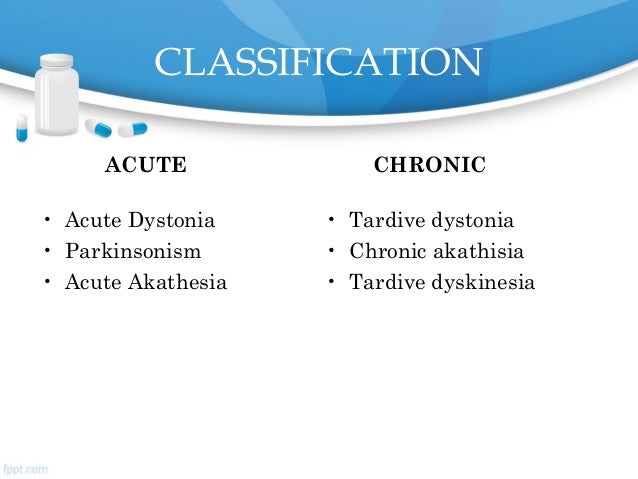
Movement disorders are drug-induced and iatrogenic in etiology experts must be particularly aware of the agents that are associated with their induction. TD refers to oro-buccal-lingual OBLD or facial dyskinesia and other tardive syndromes.

Movement disorders are frequently a result of prescription drugs or of illicit drug use.
Drug induced movement disorders ppt. Drug-induced Movement Disorders Mishal Abu Al-Melh MD FRCPC 19 May 16. Introduction Drug-induced movement disorders are varied and can be caused by a number of medications that alter central nervous system neurochemistry D2 receptor blockade Include. Parkinsonism Tardive phenomena Chorea Dystonia Tremor Akathisia Myoclonus Tics and Neuroleptic.
View Drug Induced Movement Disorders PPTs online safely and virus-free. Learn new and interesting things. Get ideas for your own presentations.
Share yours for free. Movement disorders 1. Functional circuits of the basal ganglia.
Sydenham chorea rheumatic infections encephalitis systemic lupus erythematosus Drug-induced chorea. Antipsychotic estrogens levadopa Metabolic and endocrine. Hyperthyroidism hyperglycemic non-ketotic encephalopathy Senile chorea Classification of chorea 32.
The drugs that are most frequently implicated in movement disorders are antipsychotics calcium antagonists orthopramides and substituted benzamides eg. Introduction Movement disorder. Term used for 1.
Physical sign of abnormal movement in absence of weakness 2. The syndrome that causes such motor abnormalities Movement disorders disrupt motor function by 1. Abnormal involuntary unwanted movements hyperkinetic movement disorders 2.
Curtailing restricting the amount of normal free flowing fluid movement hypokinetic movement disorders. Drug-induced movement disorders ie akathisia tardive dyskinesia dystonia and parkinsonism pose a significant burden to patients and may result in medication nonadherence or abandonment of therapy. Dopamine-receptor blocking agents such as conventional antipsychotics eg haloperidol and chlorpromazine and antiemetics eg metoclopramide and prochlorperazine are.
Drug adverse reaction and drug-induced disease Department of Pharmacology Shantou University Medical College Yan-Qiong Zhou Drug adverse reaction commonnormal. This ppt is regarding DRUG INDUCED HEMATOLOGICAL DISORDERS covering the definitions causative drugs pathophysiological mechanisms manifestationsand management of 5 blood disorders. Do go through this ppt and send me ur reviews.
9 Comments 96 Likes Statistics Notes Full Name. Movement disorders are frequently a result of prescription drugs or of illicit drug use. This article focuses on prescribed drugs but briefly mentions drugs of abuse.
The main emphasis is on movement disorders caused by dopamine receptor-blocking agents. Drug-induced diseases are adverse effects of drugs on different organs or parts of the body. They may be predictable or unpredictable.
Drugs Shown to Cause Movement Disorders. TD refers to oro-buccal-lingual OBLD or facial dyskinesia and other tardive syndromes. A Gait ataxia with high doses b A major metabolite of amoxapine has a major dopamine receptor-blocking effect c Clozapine appears to be the atypical antipsychotic that is least likely to cause drug-induced movement disorders although cases of.
DRUG-INDUCED MOVEMENT DISORDERS Genetic factors Pille Taba MD PhD University of Tartu Estonia 4 February 2018 Bordeaux MDS-ES Winter School for Young Neurologists Etiology of movement disorders Neurodegeneration Immune mediated Metabolic Toxic and drug induced Traumatic Vascular Infections Psychogenic Drug induced movement disorders Parkinsonism. Drug-induced movement disorders in older adults. An overview for clinical practitioners.
2007 Feb222149-65 Soares-Weiser K Fernandez HH. 2007 Apr272159-69 Sun B Chen S Zhan S Le W Krahl SE. Subthalamic nucleus stimulation for primary dystonia and tardive dystonia.
200797Pt 2207-14 Mena MA de. Drug-induced parkinsonism is likely the most common drug-induced movement disorder and one of the most common nondegenerative causes of parkinsonism. Any medication that interferes with dopamine transmission may cause parkinsonism.
The prototypical drugs are dopamine receptor blocking agents specifically those that block D2. Drug-induced parkinsonism and idiopathic Parkinson. A large and ever-growing number of medications can induce various movement disorders.
Drug-induced movement disorders are disabling but are often under-recognised and inappropriately managed. In particular second generation antipsychotics like first generation agents are associated with potentially debilitating side-effects most notably tardive syndromes and parkinsonism as well as. Drug-induced movement disorders from prescription medications are common sometimes go unrecognised and are often inappropriately managed.
The most common drugs to cause these side-effects are dopamine receptor blocking agents primarily antipsychotics and antiemetics including metoclopramide and promethazine. Compared with first generation antipsychotics FGA. Movement disorders are drug-induced and iatrogenic in etiology experts must be particularly aware of the agents that are associated with their induction.
Movement disorder neurology encompasses several aspects of basic science including neuroepidemiology molecular biology neurochemistry and neuropharmacology as well as neurophysiology. In addition because most movement disorders are.